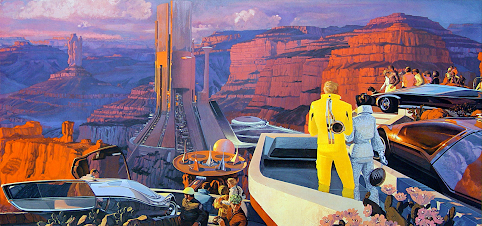Reflecting
Will Langston
Thinking About Feedback from the Honors Committee
Presenting my ideas and getting feedback was a good way to think about how I want to adapt my research moving forward...
I have been thinking about future settlements or built environments that can adapt to high danger environments that we are unfamiliar with. The honors committee asked that the ideas don't really seem like they involve outer-space necessarily, and I haven't looked at it that way before. They suggested that maybe it does not involve space, but rather just the planet itself, because maybe the planet that has this really drastic environment could be the Earth in the far away future.
Potentially, what if our planets orbit becomes elliptical, meaning that it will only be habitable in the summer. Meaning that other life on the planet hibernates or nests eggs in the winter to repopulate in the summer time.
I think researching or picking one area of an environment and making it extreme and showing how future civilizations could build or adapt to that could be an focus that I really would enjoy exploring more.
But also, Pedro Veloso was wondering if it was too ambitious to visualize this future environment and studying the more hard science environmental planetary effects. I agree the scope is too large but I think I want to still develop both of these thoughts. But maybe instead of narrowing that scope, I can narrow how much I am thinking about the environments I want to adapt.
I found this article on visionary futurist architecture projects that heavily involve the use of space travel, most of them are making intelligent inferences about the new technologies that humanity would be able to develop by the time that their specific project would be possible. So there are no limits to what the designer wants to produce. But all of it is based on possibility and practicality.



Hi Will! I would make sure that whatever your choice, it will be able to be completed in the allotted timeframe. I would also focus on the graphics, as that is what made your presentation stand out.
ReplyDelete- Juls
Hi, Will!
ReplyDeleteThere are definitely enough extreme climates on Earth to study lol, but I still like the zero-gravity vacuum conditions of space more. Architects have been thinking about how to adapt to Earth's climate for centuries; therefore, little realistic space architecture has been created. It's time to reverse the narrative. Using Earth's climates as a starting point would be interesting, though. You should also consider reaching about to an astronomy professor as a source or to be on your committee - I think that would be really helpful and less stuff for you to research.
-Katie
Hey Will. I think that having a scope that was a little too big was a common thing throughout the presentations. Like you were thinking, i also that that it would still be good to have that secondary element in your research even if maybe its expansive as you have currently. when talking about living in these extreme conditions my first thought was about high school biology learning about extremophile which are organisms that live on earth under some of the most extreme conditions. that may be something to glance at an see how nature can inform you about that genre of design.
ReplyDeleteHey Will,
ReplyDeleteYes I think that's actually a fair point that your topic of study relates more to planetary conditions than conditions of the void of space which helps clarify your research. It is interesting though, how to determine what circumstance these planetary conditions would occur under or how they may become. I think this is a creative way to apply theoretical research to future real world applications.